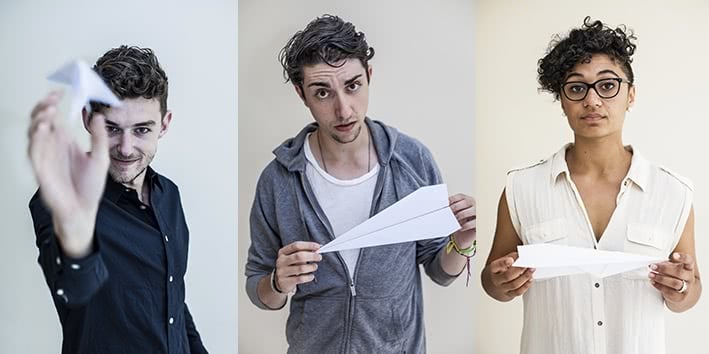Throughout the ’90s, the most iconic moments of global media numbered Nelson Mandela being freed from prison, the death of Princess Di, the O.J. Simpson circus and the suicide of Kurt Cobain – personal stories.
Of course, this was also the era of the First Gulf War and the Oklahoma City bombing, so war and terrorism certainly weren’t unknown. But the terror of the previous few decades had seemingly subsided. Nowadays, we live in a world shadowed by 9/11; by the Bataclan attack, by the Boston Marathon and London Underground bombings. Violence is at the forefront of many minds.
UK playwright Stuart Slade’s BU21 explores the psychological aftermath of a fictional terror attack, and how a young generation of survivors handle the trauma. Outhouse Theatre’s director Erin Taylor takes us into a savage but darkly humorous world.
“It’s a unique play in that it is primarily made up of monologues,” Taylor explains. “I think the thing that strikes me the most, and Jeremy [Waters] as well as producer, is that it’s brilliant writing. Even though it is about trauma, and is essentially a terrorist incident, it is so blackly funny, and the language is so naturalistic, it feels like you’re having a conversation with a friend. It’s startling; it takes your breath away sometimes how people describe what they’re going through in such a casually blunt way, and then they’re suddenly guarded, the next minute they’re funny.
“I think the thing that sparked my imagination was the brilliance of the words that [Slade] crafted. It’s unlike anything I’ve read recently. He’s dealing with such a serious and contemporary issue in a way that seems so real. It’s dark, it’s funny. The characters are incredibly flawed; they don’t really know how to cope. They’re just muddling along, and we go along with them.”
There is something inherently compelling and immediate within a play structured in monologues – for proof you need look no further than Terminus by Mark O’Rowe – and given the current climate of terrorism and uncertainty, BU21 is likely to be quite resonant. Although Slade has set his story in the recovery from a British attack, one does not need to search far to find emotional parallels with Sydney. While we have been comparatively lucky – the horror of the Martin Place siege being the exception – it remains an awfully sobering concern that Sydney is itself a target today.
“[Slade]’s been interviewed a lot about this, how he was struck by this thought of what would happen after [an attack],” says Taylor. “At the opening of the play one of the characters say, ‘We’re inundated with these stories of terror and horror and war, and you feel like you should just turn them off but you can’t look away.’ You feel like it’s never going to happen to you – and then it does. It will be interesting for Australian audiences. I don’t know if we have that palpable feeling of something really big happening in Sydney or elsewhere, but I think we also do have a feeling that something might. What will that be and when is it going to happen? I think our feelings have shifted from if, to when, and what will that be? How will we deal with it? I think that’s quite a contemporary thought.
“[Slade has] specifically chosen characters that are reasonably young, and in their consciousness they have September 11 in their teenage or young adulthood. They’re not characters who have lived without that consciousness, so he’s really writing about young people who have always lived with this in their minds.”
Though the catalyst for the story is anchored in terrorism, terrorism per se is not BU21’s main concern. Rather, it is the way we learn to live with trauma; specifically, how a young generation raised on the spectre of violent extremism manage to rebuild their lives in the face of cataclysm.
“All of the characters know each other, have met and come together through this mutual trauma they’ve experienced. They’ve all met through group therapy. There’s this really interesting [sentiment] in the play, that when you’re in pain, pain isolates you. It doesn’t bring you together, and so all you can really do is focus on yourself. So taking that idea of pain isolating you, and turning it into the form of the play, the monologues. So people are trying to interact with each other, but what they’re really doing is just trying to make it through the day with their pain.”
Trauma, terrorism, pain. While it isn’t exactly happy-go-lucky fare, Slade’s writing is so fresh and engaging that Taylor believes audiences can’t help but be engaged by these vulnerable, very human characters.
“He’s relatively new to theatre writing. This is his second full-length play. He has this obsession with contemporary language and ideas. He’s definitely a writer who is really working in a contemporary space, and working out the problems that young people have today. So he’s not new to writing, but he is to theatre, so that’s probably why he seems so vital and distinct. He really plays around with the form that theatre uses. This play is kind of described as… it’s very similar to a verbatim piece of theatre, but what he’s done is fictionalise and theatricalise it. It feels like we have people telling us real stories, but [Slade]’s really taken a step away and given us fictional characters.
“I think that he’s someone who is new but very passionate about theatre, who is wanting to test the genre and form. It feels very exciting and very real.”
[BU21 photos by Michael Booth]
See BU21 at theOld 505 Theatre, running Wednesday February 8 – Saturday February 25.


































